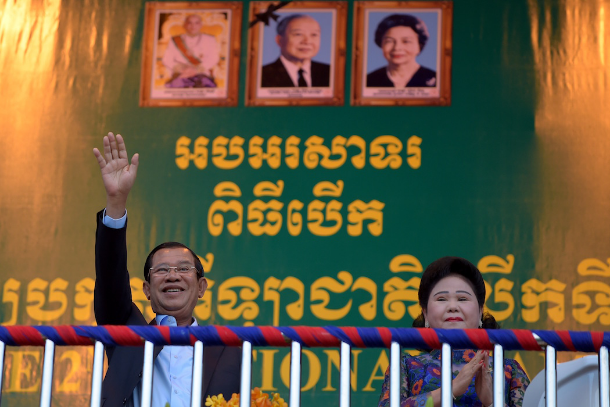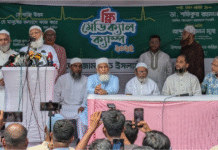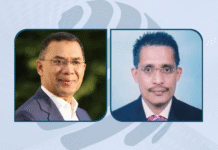A Hun Sen poll victory is as certain as death and taxes
But for the Cambodian premier the devil remains in the voting details

Cambodian Prime Minister Hun Sen (L) and his wife Bun Rany greet people during the 2nd National Games at the Olympic National stadium in Phnom Penh on May 25. (Photo by Tang Chhin Sothy/AFP)
Crucial for the politburo and the ruling Cambodian People’s Party (CPP) will be the turn out rate, the popular vote count, and success or failure of minor parties following the dissolution of the opposition Cambodian National Rescue Party (CNRP).
Hun Sen’s critics argue his near defeat at the last election sounded the death knell for the CNRP’s destruction and 25-years of a sometimes flawed democracy, bolstered by Western support — leading into The Repression, as it is known in some quarters.
It has its roots in the vicious bashing of two opposition parliamentarians, then escalated with Hun Sen alleging the CNRP and the United States were conspiring to undermine his administration through a ‘color revolution’.
The CNRP was dissolved by the courts, opposition politicians and supporters were jailed or fled. Independent media outlets were closed or sold to pro-government business interests, some journalists were charged with espionage or treason and self-censorship now dominates the industry.
Cambodians have been told they must vote, must not be critical of the National Election Committee, question official numbers or the government, and driving that point home are prosecutions for seemingly innocuous posts on Facebook.
In the pre-election build-up, Hun Sen declared that the ‘threat to national security’ had been averted, but the damage to his country’s international reputation was done. At home, government support is also being challenged by a growing tide of anti-Chinese sentiment and enforced tax compliance that hit Cambodians badly for more than a year before the election.
The carnival is over
The political circus of previous elections is sadly absent this year. Gone are the tens of thousands of youth from all political parties who rallied across the capital in the lead-up to the last poll, with painted faces and exchanging chants: “Change” — “No Change.”
Their urban lives are a far cry from the villages of their parents, the CPP heartland where Hun Sen can muster support from old allies, those who remember the travesties of war and still thank him for ending it, back in 1998.
In the capital hundreds of thousands turned out five years ago when then CNRP leader Sam Rainsy returned from exile to contest the poll, shutting down the main highway from the airport to the city.
Aggravating the political landscape in the bloody aftermath of 2013, however, was Sam Rainsy’s refusal to accept the result. He made unsubstantiated allegations the poll was rigged, organized widespread violent protests that culminated in the deaths of at least half-a-dozen people, and laid the spadework for The Repression to come.
He is now back in self-imposed exile and the 2018 poll is virtually a CPP only show, and a drab one at that.
Smaller parties don’t have budgets for big rallies. But this time there are 20 political outfits contesting the ballot, compared with eight in 2013 when the CNRP obliterated all of them.
Human rights groups claim most minority parties contesting this Sunday’s ballot are simply proxies for the CPP, enabling it to extend a near four-decade grip on power. However, three stand out as independents; the Khmer Will Party, Grassroots Democracy Party and the League for Democracy Party.
All three could benefit from protest votes, particularly among the biggest voting population — the post-war baby boomers — who gave the CNRP their edge at the last election and remain thirsty for change from a government that has its roots in Chinese and Vietnamese communism and is often criticised for its lack of a modern day outlook.
Battle for the heartland
In 2013 voter registration was 9.67 million and turnout was low at 68.5 percent. Helped by gerrymandering, the CPP won 3.2 million popular votes and picked up 68 seats in the 123-seat parliament. The CNRP took the remaining 55 seats and scored a tantalisingly close 2.9 million votes. These remain key numbers.
Hun Sen must win well in the rural heartland, which has been empowered by technology, smart phones and unprecedented access to knowledge.
Still, with the closure of The Cambodia Daily, the sale of The Phnom Penh Post, and shutting down of more than 30 broadcast frequencies, perennial stories that once dominated a robust public discussion simply don’t get the coverage they once did.
An oppressive tax regime, human trafficking, illegal logging, land grabbing, mega-dam construction, government corruption — which Hun Sen admits is a big issue — floods and poor garbage collection were all once a part of a regular daily reading diet.
But it is perhaps the lack of local critical coverage afforded state-sponsored investment from China, the arrival of many thousands of Chinese workers — doing jobs that Cambodians are capable of handling — and their impact on society that is missed most.
The cranes that dominate an unthinkable skyline just a decade ago are now symbols of Chinese expansion and Beijing, like in other places on the planet, is never shy in revealing its thin skinned approach to anything critical of China in the local press.
Chinese gangs roam the streets of the southern port town of Sihanoukville, where their businesses are booming, scaring-off people. Khmers complain Chinese expats and many of the two million Chinese, who come here every year as tourists, look down on them.
Individual stories of Chinese businesses bullying people into selling their properties are rife and the Chinese embassy here has acknowledged problems.
Foreign policy has changed too as Cambodia shifts from the West and into the arms of a much bigger spending China that counts on Phnom Penh for support on big ticket diplomatic issues, like its desperately wanted command over international waterways in the South China Sea.
Though well-aware, business groups, Christian, Islamic and the overwhelming Buddhist clergies have also been noticeably silent on the many issues that Cambodians will take with them into the polling booths on Sunday.
How many of them do and who they vote for will be scrutinized, not just by the Chinese who have largely replaced an international contingent of election monitors, but by governments threatening sanctions, human rights groups, lawyers, Cambodians living abroad, financial and political analysts and an increasingly concerned foreign press corp.
The results will further reshape the global view of Cambodia and whether or not its “slide into dictatorship”, as famously headlined by The Cambodia Daily on its last front page, is complete.
Once done, this election should also provide pause for a rethink within CPP ranks, particularly in regards to its policies that have been used to intimidate Cambodians ever since the shock result of the last election.
Luke Hunt is opinion editor at ucanews.com









